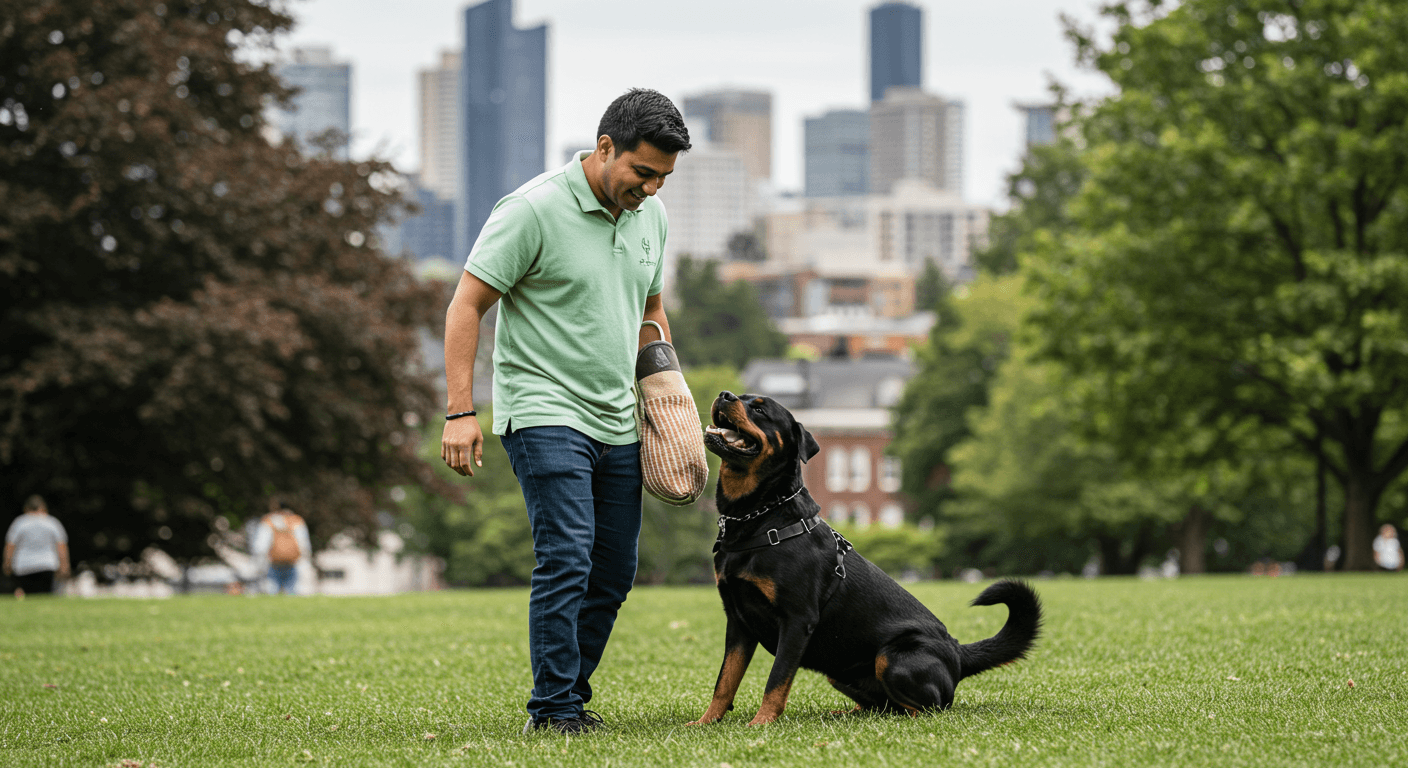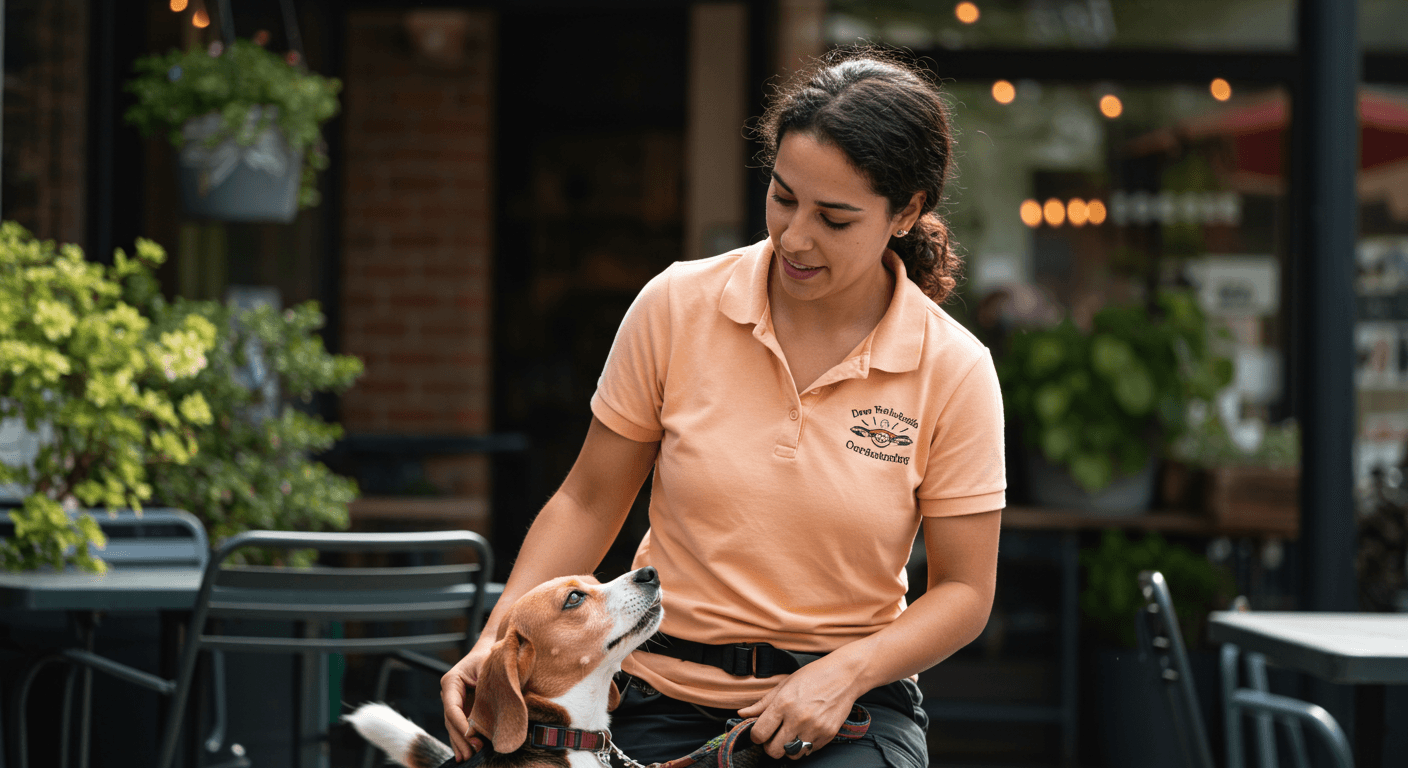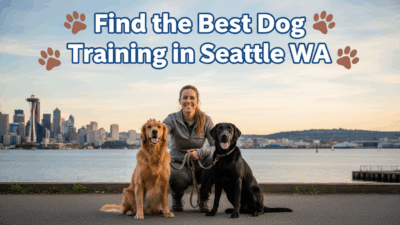Your Complete Guide to Choosing a Dog Trainer in Seattle
Living with a dog in Seattle means navigating busy Capitol Hill sidewalks, managing rainy-day energy in Ballard, and keeping your pup calm during ferry rides or visits to Pike Place Market. Your dog needs skills that go beyond basic commands, from polite greetings at crowded coffee shops to staying focused around Fremont’s weekend crowds.
Seattle sits in King County, where city and county regulations shape how you can train and enjoy public spaces with your dog. When you find a professional dog trainer who understands these local realities, you’ll get better results both at home and around the city’s unique urban environment.
How to Choose the Right Trainer
Start by looking for someone who uses positive reinforcement training and understands what your Seattle lifestyle demands. This means your dog should learn to handle bus rides, stay calm near skateboarders on the Burke-Gilman Trail, and manage the distractions of farmers markets without pulling or lunging.
Credentials offer a quick way to compare experience and training philosophy. Common dog trainer certifications include CPDT-KA, KPA-CTP, or IAABC-CDBC for behavior concerns. If your dog shows serious aggression or reactivity, look for someone with CBCC-KA or a science-based program like CTC.
In-home dog training works great for puppy manners, door behavior, and neighborhood leash skills specific to your block. Group classes make sense once your dog can focus around other dogs, especially before you tackle high-traffic areas like Green Lake or Alki Beach.
Common Dog Training Methods Explained

Reward-based methods build the trust and confidence your dog needs to handle Seattle’s sensory overload. They also help you follow King County’s rules about keeping dogs under control in public.
Basic obedience covers sit, down, stay, place, recall, and leash training so your dog can handle crowded sidewalks, brewery patios, and park visits without pulling or jumping on strangers.
Puppy training focuses on socialization, potty training, bite control, crate comfort, and early leash skills. Starting with short, positive training sessions prevents bad habits from taking root during those crucial early months.
Behavior modification addresses fear, reactivity, resource guarding, or separation anxiety through careful desensitization and counterconditioning. For serious cases, ask if your trainer collaborates with local veterinarians who understand behavior issues.
Private lessons and in-home sessions let you customize everything around your daily routines and specific neighborhood challenges. Day training can speed up results when your schedule is packed.
Dog training classes help your dog practice good manners around other dogs and people. The best classes give dogs plenty of space, screen participants carefully, and teach calm behavior rather than just excitement.
Specialized training like therapy dog training or service dog training requires extra structure, public-access skills, and a very clear step-by-step training program.
Stay away from trainers who rely on fear, intimidation, or pain to get results. Humane methods are safer for everyone, easier to maintain long-term, and much better for living in close quarters with neighbors.
Average Cost of Dog Training in Seattle WA (Updated for 2025)
Prices around Seattle and King County depend on the trainer’s experience, session length, and location. Here’s what most dog owners are paying for training for dogs in 2025.
| Service Type | Average Cost (Seattle/King County) |
|---|---|
| Puppy classes (4-6 weeks) | $180-$320 total |
| Group obedience classes (4-6 weeks) | $190-$350 total |
| Private lessons (60-90 min) | $130-$220 per session |
| In-home coaching packages (4-6 visits) | $500-$1,050 total |
| Day training (trainer works your dog + handoff) | $500-$1,100 per week |
| Behavior consult for reactivity/anxiety (initial) | $175-$300 |
| Board and train (2-4 weeks) | $2,400-$5,200 total |
You’ll probably pay extra travel fees for longer distances within King County, and expect higher rates for complex behavior work or aggressive dog training.
Make sure you understand what’s included, how the trainer tracks progress, and whether they offer a free consultation before you commit to a training program.
Questions to Ask a Potential Dog Trainer
- What dog training services do you offer, and which approach fits my dog’s needs and our Seattle lifestyle best?
- What training methods do you use, and how do you keep training sessions positive and low-stress?
- What credentials do you have, like CPDT-KSA or KPA-CTP? Do you keep up with continuing education?
- How will you customize the plan for my dog’s specific issues and the distractions we face in our neighborhood?
- How will we measure my dog’s progress and know when to add more challenging environments?
- What are the total costs, including any travel fees within Seattle, and what’s your cancellation policy?
- Do you carry liability insurance, and can you show me proof?
- For behavior problems, will you work with my veterinarian or a veterinary behaviorist if needed?
- What should I practice between our sessions to help my dog keep improving?
Local Seattle Rules and Considerations
Seattle enforces leash laws and nuisance rules to keep parks and neighborhoods safe for everyone. King County follows Washington State’s public health requirements too.
Leashes are required in all public spaces except inside designated off-leash areas. Keep a standard leash with you for sidewalks, greenways, and community events.
Washington State requires current rabies vaccination for all dogs. You can get these through county clinics or your regular vet, and find more details through King County’s animal licensing program.
Seattle Municipal Code 9.25.084 requires dogs to be under control and prohibits excessive barking. Work with your trainer on alert barking and separation anxiety before neighbors file complaints.
If your trainer wants to use city parks for commercial sessions, they may need permits and proof of insurance. Check with Seattle Parks and Recreation for current requirements.
Washington State doesn’t require special licenses for dog trainers. However, if a business boards dogs for payment, they may need to follow kennel licensing requirements under state animal welfare regulations.
King County requires all dogs to be licensed, and you’ll need proof of current rabies vaccination to get your license. Visit the King County Pet Licensing page for details.
Local Seattle Resources for Dog Owners
These spots give you great places to practice polite manners, work on recalls, and provide safe enrichment for your dog. Always follow the posted rules and etiquette guidelines.
- Magnuson Park Off-Leash Area offers 9 acres of fenced space with separate sections for small and large dogs, plus beach access for water-loving pups.
- Golden Gardens Park Off-Leash Area in Ballard provides beach access and open space for recall practice during quieter times.
- Westcrest Park Off-Leash Area in West Seattle features 4 acres of wooded trails and open meadow for varied training environments.
- Discovery Park welcomes leashed dogs on most trails, giving you perfect opportunities to build focus around wildlife, families, and joggers.
- Seattle Off-Leash Areas maintains a complete list of all city dog parks with rules and hours.

FAQs
How much does in-home dog training cost?
Most Seattle trainers charge $130-$220 per in-home visit, with discounts available when you buy packages. Behavior problems typically start at the higher end of that range.
Is in-home dog training worth it?
Absolutely, because you’re working on problems exactly where they happen. Your trainer can fix door manners, jumping on guests, counter-surfing, and window reactivity right at home, then step outside to practice leash skills on your actual neighborhood sidewalks with real-world distractions.
Can you pay someone to house train your dog?
Yes, many trainers offer puppy programs that include potty training, crate routines, and daily schedules. Day training can speed up the process while teaching you how to maintain the progress.
What is the 3-3-3 rule for dog training?
This is a helpful timeline for new or adopted dogs: expect about 3 days for your dog to decompress, 3 weeks to learn your routines, and 3 months to feel completely settled. Good training plans work with this natural adjustment period.
How long will it take to reach my training goals?
Most puppies and friendly adult dogs show solid progress within 4-8 weeks if you practice daily. Fear, reactivity, or aggression typically requires several months of careful behavior modification with gradual increases in difficulty.
What should I bring to group classes?
Pack a flat collar or harness, a 6-foot leash, high-value treats, water, and current vaccination records if your trainer requests them. Leave retractable leashes at home for safety reasons.
What’s the leash law in Seattle?
Dogs must be leashed and under control in all public areas, except inside designated off-leash dog parks. Keep that standard leash handy for sidewalks, Pike Place Market, and community events.
Do I need a dog license in Seattle or King County?
Yes, King County requires all dogs to be licensed. You’ll need proof of current rabies vaccination to get your license, which you can obtain online or by mail through King County Pet Licensing.
What shots does my dog need in King County or Washington State?
Rabies vaccination is required throughout Washington State. Your veterinarian may also recommend distemper-parvo, bordetella, and leptospirosis based on your dog’s lifestyle and exposure to other dogs.
Are dog trainers required to be licensed in Seattle or King County or Washington State?
No special trainer licenses exist in Washington State. Trainers follow normal business regulations, but if they offer board and train services, their facility may need to comply with state animal care regulations.
Where can I practice off-leash recall?
Use fenced off-leash areas like Magnuson Park, Golden Gardens, or Westcrest Park to keep things safe and legal. Try visiting during quieter weekday mornings when you’re starting out.
Which dog parks allow training around Seattle?
All Seattle off-leash areas allow training within their fenced boundaries. Magnuson Park, Golden Gardens, and Westcrest Park are all solid options for practice sessions with your well-behaved dog.
What beaches or trails allow dogs for training?
Leashed dogs are welcome on most trails at Discovery Park and Carkeek Park. Golden Gardens Park and Magnuson Park both offer beach access within their off-leash areas, perfect for teaching calm focus around water and wildlife.
How do I help my dog with separation anxiety?
Work with a certified dog trainer or behavior consultant who specializes in anxiety issues. They’ll create a gradual desensitization plan that builds your dog’s confidence when left alone, starting with very short absences and slowly increasing duration.
What should I do if my dog is reactive on leash?
Contact a trainer experienced in reactivity and behavior modification. They’ll help you identify triggers, increase distance from scary things, and teach your dog new responses to replace the lunging or barking.
Can expert dog trainers help with apartment living challenges?
Yes, many Seattle trainers specialize in urban living and can help with potty training on high floors, reducing barking in shared buildings, and teaching calm behavior in elevators and hallways.
The right combination of thoughtful planning, humane methods, and consistent practice around Seattle’s neighborhoods will help your dog become a confident companion. Whether you’re walking through Capitol Hill, exploring Fremont, visiting Green Lake, or relaxing in Queen Anne, a solid training program prepares your dog for everything this city offers. If credentials matter to you, don’t hesitate to ask about continuing education and how your trainer stays current with new techniques.
